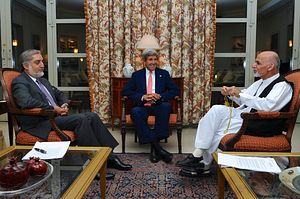Afghanistan’s two rival presidential candidates, Abdullah Abdullah and Ashraf Ghani, have agreed to a unity government deal. The agreement, brokered by the United States, was described by U.S. Secretary of State John Kerry as “an Afghan solution to an Afghan problem.” Following the 2014 run-off election on June 14, widespread allegations of fraud from Abdullah’s camp prompted a major political crisis, threatening to fragment Afghanistan at a crucial time in its political transition from one government to another. Abdullah alleged that Ghani’s camp had rigged the elections through corrupt practices, including ballot stuffing. Following weeks of disagreement, Kerry managed to broker an agreement that includes an audit of 100 percent of all votes cast in the run-off election, and called on Ghani and Abdullah to work towards a unity government in the meantime.
Specifics of the unity government agreement are still rather indeterminate. The government structure, particularly what role each of the two candidates will play, is still unknown. For the United States, having a new Afghan government in place in time for the upcoming NATO summit in early September is a priority. Furthermore, having a new Afghan government would allow the United States to finalize the terms of the long-stalled Bilateral Security Agreement (BSA), which would allow the United States to leave behind a small contingency force to help train the Afghan National Army (ANA) and conduct limited counter-terrorism operations. Regardless of whether the BSA is signed, most U.S. and NATO troops will leave the country at the end of this year.
The unity government itself averts the immediate possibility of civil war. Each candidate has a robust support base split among geographic and ethnic lines. Abdullah, an ethnic Tajik who led the polls in the April 5 general election, has the backing of Afghanistan’s Tajik population. He further has the support of Mohamed Mohaqiq, a Hazara leader, Gul Agha Sherzai, a Pashtun leader, and other powerful Afghans. Ghani, an ethnic Pashtun, similarly has the support of the country’s Pashtun-dominated south. Pashtuns comprise a plurality in Afghanistan. Ghani’s supporters include Rashid Dostum, a powerful Uzbek former warlord, and Qayyum Karzai, President Hamid Karzai’s brother.
While the unity government averts the prospect of immediate civil war, it has its own problems. As other analysts have catalogued, the unity government proposals that existed prior to this deal were all lacking in concrete vision. As Srinjoy Bose and Niamat Ibrahimi write in Foreign Policy, “in the absence of well-organized political parties, a unity government in the Afghan context may mean ethnic distribution of power, which has been the de facto formula under Hamid Karzai’s administration.” The implementation of this unity government deal will have important ramifications for the future of Afghanistan’s government and politics.
































